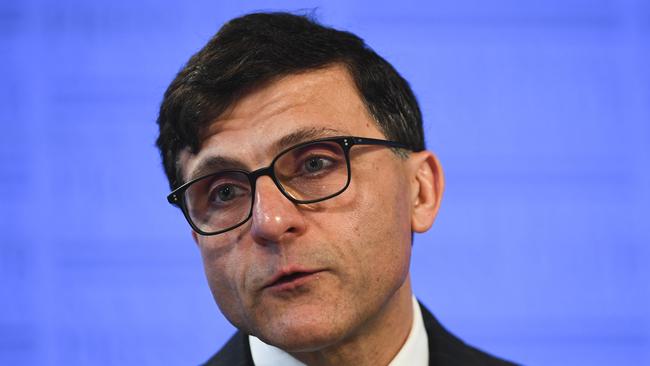Pezzullo’s response to article ‘emotive’
Law Council head warns of a ‘creeping erosion of freedoms’ following AFP raids on a journalist.

The head of the Law Council of Australia has criticised Home Affairs secretary Mike Pezzullo for his “emotive” response to a News Corp article that triggered a raid on journalist Annika Smethurst’s home, as he warned of a “creeping erosion of media freedoms”.
Addressing the National Press Club, Arthur Moses SC said the disclosure of classified information by the media should only be criminalised if it can be proven to have posed real harm to national security.
The Australian Federal Police raided Smethurst’s home in June over a 2018 story she wrote suggesting the country’s cyber spy agency, the Australian Signals Directorate, could for the first time monitor Australians.
Dubbed a “power grab” in the story, the report relied on top secret letters between Mr Pezzullo and Department of Defence Secretary Greg Moriarty.
Mr Pezzullo declared the leak was “designed to play into a Canberra game about which agency is asking other agencies to expand its powers and remits”.
Fronting the powerful Parliamentary Joint Committee on Intelligence and Security inquiry into press freedom last month, Mr Pezzullo said it was “completely unacceptable” for public servants to be playing in that way and called for the leaker to go to jail.
Mr Moses said such behaviour lashed by Mr Pezzullo was not a good enough reason for the raid on Smethurst’s home.
The LCA president called for the concept of ‘harm’ in section 122.4A of the Criminal Code to be clearly defined so that it was “more than just embarrassment to government or some bureaucrat being humiliated because a grand plan to acquire more power has been exposed”.
Under the section, a journalist can commit an offence if they publish secret or top secret government information if it “harms or prejudiced the health or safety of the Australian public or a section of the Australian public”.
“What became apparent, if I may say so respectively, was a very emotive response by an individual (Mr Pezzullo) in relation to this in effect being part of a ‘Canberra game’ where one agency was potentially leaking information against another agency,” Mr Moses said.
“That is not relevant to national security. That is a game between two departments. That should never be the trigger for there to be a raid on the home of a journalist in respect of gathering information, certainly trying to find the source of the journalist’s story.”
Mr Moses said there had been 75 pieces of federal national security legislation that had passed since September 11, representing a “slow erosion of our freedoms”.
While there was a public interest defence in section 122.3 of the Criminal Code, he said it was not sufficient to safeguard press freedom.
“Until the raids Australians for the most part believed press freedom was protected by law. They were wrong,” Mr Moses said.
“The onus should be on the prosecution — not the journalist — to establish that the disclosure was not in the public interest in relation to the publication of the journalist.
“The government should be forced to prove in open court why it was not in the public interest for a journalist to expose the fact that an agency was seeking more powers to access personal details of citizens without their consent. The absurdity of the government taking such position would soon become clear and be met with a response by the community at the ballot box.”




To join the conversation, please log in. Don't have an account? Register
Join the conversation, you are commenting as Logout